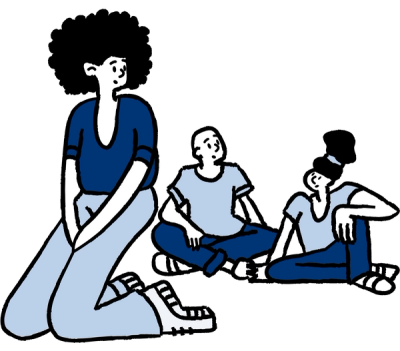Humans are naturally social creatures, so strong connections to others are one of the most important factors in our mental health.
Healthy relationships with friends, family members, co-workers and acquaintances can help you to feel connected, have greater resilience in the face of challenges, and even make you physically healthier.
What is a good social connection?
How people choose to form friendships and relationships can be very different. There’s no ‘one size fits all’ approach.
In general, a good social connection can look like:
- Feeling supported by those around you
- Being comfortable sharing your thoughts and feelings with others
- Authentically caring about other people and what’s happening in their lives
- Having someone at work you can have lunch with or talk to about the things going on in your life
- Having someone you want to talk to about changes in your life or news you want to share
- Having someone to do hobbies with
- Having someone who feels passionate about the things you feel passionate about
- Having someone who can look past differences and appreciate you for who you really are.
A good social connection can be a great source of comfort. We may feel connected to people physically close to us, like our neighbours or house members, or to people who we connect with over the internet or the phone.
What is loneliness?
Social connection isn’t about how many friends we have, it’s about how happy we are with the connections we have. We’re all different, and what feels like the right amount of friends for one person might feel like far too many or too few for others. It’s also totally ok to be ok with very few or no social connections if that feels right for you.
Why is it important to have good social connections?
As far back as we can trace, humans have thrived in social groups and relied on their community for safety, a sense of identity and good health. It’s no coincidence we often say ‘a burden shared is a burden halved’.
Social connectedness can boost our mental health by:
- Creating a sense of belonging, purpose and identity
- Reducing your stress levels
- Giving you an improved sense of self-worth
- Boosting your confidence
- Boosting your levels of resilience
- Making you feel more positive.
Science shows that social connectedness is actually a critical pillar when it comes to good physical health as well.
Studies have found that feeling lonely is as bad for us as smoking 15 cigarettes a day. Loneliness has been found to disrupt sleep patterns, elevate blood pressure and increase the stress hormone cortisol.
On the other hand, good social connection helps us recover from disease and illness faster and strengthens our immune system.
How can I get started?
Making new friends can be hard or sometimes even feel downright impossible. Especially as we get older, it might seem like there are fewer opportunities to meet new people and that people are more closed off to new friendships.
While it might take more work, if you’re ready to get started on building new connections, there’s a range of different ways to go about it.
It can take time to form friendships and deep connections, so it’s important to be patient. It also takes practice and a little bit of confidence and vulnerability to reach out to someone new, so don’t be disheartened if it doesn’t work straight away.
Some of the ways you might like to meet people and form connections include:
- Join a gym or sports team
If you’re into sports, joining a gym or sports team can be an excellent way to meet new people and form new connections while also improving your physical health.
Some gyms offer group classes, such as Zumba, HIIT, boxing or pilates, so you can pick a class according to your interests. Joining a sports team can be an even better way to meet people who are passionate about the same sport as you and build a sense of community around your shared interests.
If you’d like to join a gym or sports team, you can research gyms and sports teams near you by searching ‘gyms near me’ or ‘join a sports team near me’.
- Joining a social club
Social clubs are informal groups of people, usually built around a shared interest, like reading, playing trivia, gardening, games, or almost anything else. There are thousands of social clubs around Australia, likely near you. Websites like Meetup make it easy to find local social clubs, so check out what’s near you and try and go in with an open mind. You can also look for social club events on Facebook using ‘find events near me’ feature. ”
- Reconnecting with a friend or relative you don’t see often
- Volunteering in your community
- Joining local Facebook group
- Taking your dog to the park and meeting other owners
- Attending community events or group meetings
Forming new friendships takes time and effort, so don’t expect anything to happen overnight. Different friendships can be built on different things, including having fun, a common interest, energy levels, time spent together or shared histories. However, most friendships share a few things in common - trust, respect for each other, and authenticity.
Some of the ways you might also like to try:
- Actively listening to your new friend
- Being ready to give or offer support
- Showing appreciation for your new friend
- Laughing and being silly
- Playing games or solving puzzles
- Finding common ground or common interests.






